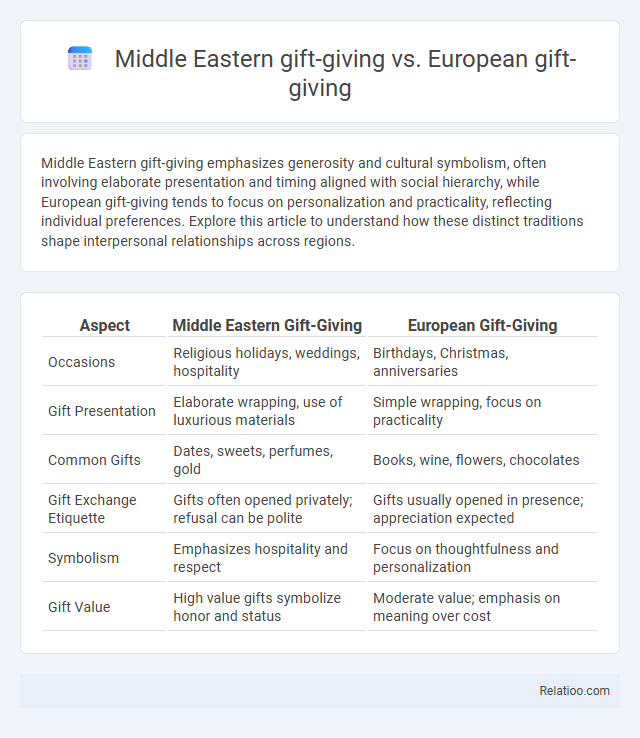Middle Eastern gift-giving emphasizes generosity and cultural symbolism, often involving elaborate presentation and timing aligned with social hierarchy, while European gift-giving tends to focus on personalization and practicality, reflecting individual preferences. Explore this article to understand how these distinct traditions shape interpersonal relationships across regions.
Table of Comparison
| Aspect | Middle Eastern Gift-Giving | European Gift-Giving |
|---|---|---|
| Occasions | Religious holidays, weddings, hospitality | Birthdays, Christmas, anniversaries |
| Gift Presentation | Elaborate wrapping, use of luxurious materials | Simple wrapping, focus on practicality |
| Common Gifts | Dates, sweets, perfumes, gold | Books, wine, flowers, chocolates |
| Gift Exchange Etiquette | Gifts often opened privately; refusal can be polite | Gifts usually opened in presence; appreciation expected |
| Symbolism | Emphasizes hospitality and respect | Focus on thoughtfulness and personalization |
| Gift Value | High value gifts symbolize honor and status | Moderate value; emphasis on meaning over cost |
Cultural Significance of Gift-Giving in Middle Eastern and European Societies
Gift-giving in Middle Eastern cultures often emphasizes hospitality, respect, and the strengthening of social bonds, with gifts symbolizing generosity and honor within close-knit communities. European gift-giving traditions tend to focus on occasions like holidays and personal milestones, where the exchange reflects thoughtfulness and individual appreciation. Your understanding of these cultural nuances can enhance the appropriateness and impact of gifts when engaging across Middle Eastern and European societies.
Historical Roots of Gift Traditions in Both Regions
Middle Eastern gift-giving traditions often stem from ancient Islamic and tribal customs emphasizing hospitality, generosity, and social bonding, with gifts symbolizing respect and alliance. European gift-giving traces its roots to Christian celebrations and medieval rituals, where gifts marked religious occasions and hierarchical relationships within society. Both regions share a historical emphasis on gifts as social currency, yet differ in cultural expressions shaped by distinct religious and social frameworks.
Social Etiquette: Rules and Expectations Around Gifts
Middle Eastern gift-giving emphasizes hospitality and respect, often involving lavish presentations and symbolic items to honor the recipient, while European gift-giving prioritizes practicality and subtlety, focusing on thoughtful, well-chosen presents that respect personal boundaries. Understanding social etiquette around gifts requires recognizing these cultural differences, as Middle Eastern customs expect gifts to strengthen social bonds and display generosity, whereas European traditions value appropriateness and timing, avoiding overly extravagant or personal items. Your awareness of these nuanced expectations enhances your ability to navigate cross-cultural interactions gracefully and fosters deeper connections.
Types of Gifts Preferred in the Middle East vs. Europe
In Middle Eastern cultures, gift-giving often involves items that reflect hospitality and luxury, such as ornate sweets, perfumes, and traditional handicrafts, highlighting respect and generosity. European gift-giving preferences tend to favor practical and personalized items, including books, wines, and artisanal products, emphasizing thoughtfulness and individual taste. These regional differences illustrate how cultural values shape the types of gifts exchanged, with the Middle East prioritizing symbolic and lavish presents and Europe favoring functionality and personalization.
Occasions for Gift-Giving: Celebrations and Holidays Compared
Middle Eastern gift-giving during celebrations such as Eid al-Fitr and weddings emphasizes hospitality and symbolic gestures, often featuring intricate packaging and valuable items like gold or sweets. European gift-giving for holidays like Christmas and birthdays centers on personalized presents and seasonal themes, with an emphasis on surprise and sentiment. Understanding these cultural differences in occasions can enrich Your gift-giving experience by aligning expectations with meaningful traditions.
The Role of Hospitality in Middle Eastern vs. European Gift Culture
Hospitality in Middle Eastern gift-giving emphasizes generosity and strengthening social bonds through elaborate presentations and reciprocal exchanges, often symbolizing respect and honor. European gift-giving tends to focus on personalization and appropriateness, reflecting cultural norms of politeness and individual relationships rather than communal obligation. The central role of hospitality in Middle Eastern culture contrasts with the more reserved and practical nature of gift exchanges in European traditions.
Symbolism and Meaning Behind Common Gifts
Middle Eastern gift-giving often emphasizes deep symbolism, where offerings like dates and sweets represent hospitality and prosperity, reflecting cultural values rooted in respect and relationship building. In contrast, European gift-giving frequently prioritizes personal preferences and occasions, with items such as wine or flowers conveying appreciation, celebration, or affection. Understanding these differences enhances your ability to select meaningful gifts that honor the cultural significance and intentions behind common presents in each region.
Commercialization of Gift-Giving: Modern Influences
The commercialization of gift-giving has significantly impacted Middle Eastern, European, and global traditions, with modern influences shaping consumer behavior and expectations. In Middle Eastern cultures, gift-giving often emphasizes hospitality, social status, and personal relationships, while European gift-giving frequently balances tradition with market-driven trends like holiday sales and brand popularity. You can observe how widespread advertising and online shopping platforms have transformed gift-giving into a commercial activity, often overshadowing cultural rituals and sentimental value.
Gender, Age, and Hierarchy in Gift Exchanges
Middle Eastern gift-giving emphasizes respect for hierarchy, often favoring elders and male figures with symbolic, valuable presents reflecting status and relationships. European gift-giving tends to be more egalitarian, with less rigid distinctions based on gender or age, focusing on personalization and practical value. Across cultures, gift exchanges reinforce social bonds, yet Middle Eastern practices prioritize age and authority, while European customs highlight individual preferences and equality.
Navigating Cross-Cultural Gift-Giving: Practical Tips
Navigating cross-cultural gift-giving requires understanding that Middle Eastern traditions often emphasize generosity and hospitality with lavish presentations, while European practices may favor practicality and subtlety in gift selection. Your approach should respect local customs, such as avoiding alcohol in Middle Eastern gifts and opting for high-quality, modest items in Europe. Tailoring gifts to cultural preferences fosters meaningful connections and shows genuine respect for diverse social norms.

Infographic: Middle Eastern gift-giving vs European gift-giving
 relatioo.com
relatioo.com